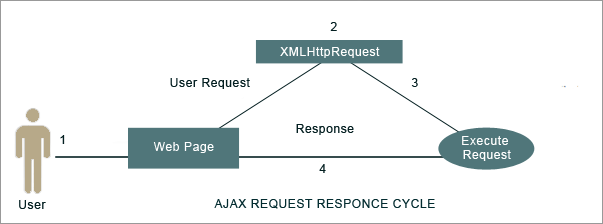What Is Ajax?

Hand off the toughest tasks in SEO, PPC, and content without compromising quality
Explore ServicesAjax stands for Asynchronous JavaScript and XML. The term Ajax was coined by Jesse James Garret in 2005 during an interview with O’Reilly Media, Inc. He famously said: “I’m a fan of (Asynchronous JavaScript and XML).
It is a web development technique that allows for better-looking and more interactive web applications, with reduced waiting times.
Ajax has become the standard way to create advanced and interactive websites, using JavaScript in the background to provide all the interactivity that a web user experiences on a web page.

Ajax is a combination of two web development techniques. The first technique is known as Asynchronous Java Script programming language, which allows the interaction between different parts of the web page, without reloading the entire page or refreshing the browser window. The second technique is XML, which allows for sending data from client to server via HTTP. Combining these two development techniques means communication between the web server server-side and the HTML client side is optimized.
Why is Ajax Important?
It’s important to use ajax as a web developer because of the positive benefits the technique has for user experience. Offering people an enjoyable, memorable, engaging on-page experience is a key part of search engine optimization, and having a reactive, high-functionality website is key in not only converting customers but also in getting ranked in search engine results pages.
Because of the way ajax works, on-page user experience metrics such as page loading and reload times are minimized, which helps provide a seamless real-time user experience.
Ajax FAQ
What is Ajax in SEO?
So, why is this important to SEO? It’s important because it can improve your site’s rankings. The main benefit for SEO with Ajax is that it allows you to interact with your visitors more easily and offer more choices. It improves the user experience, which is a ranking factor in itself.
Ajax has become so prevalent on the Internet, that Google was forced to create its own document on how to implement Ajax in an SEO-friendly way. The main points include:
When implementing Ajax, you should still have a page title, even if it’s not clickable. This should be a functional title.
Use a robots noindex metatag on all your JavaScript files (not just the one being called in the header). Try to keep the file size as small as possible.
Create separate pages for Ajax applications, and link to them from your main website.
Is Ajax bad for SEO?
The primary SEO concern with Ajax is that the connection between web page and server is closed as soon as the JavaScript code is processed. This leads to indexing issues if you’ve got a lot of content that is only viewable by people using the Ajax version of your site.
A special tip from us at Loganix to fix this problem is to use XML Sitemaps in the XML format rather than XHTML format.
Is JavaScript bad for SEO?
JavaScript in itself is not bad for SEO. It can be implemented in a way that doesn’t cause any problems. However, because JavaScript isn’t machine-readable, it’s much harder for search engines to crawl your scripts and understand what each one does, so they won’t gain as much value from the content on your site as they would from normal HTML pages.
Summary
Hopefully, this article has given you a better understanding of ajax. For many website owners, merely understanding the concept behind ajax as a web development technique is enough, because it falls to web developers and programmers to implement the technique used to create websites.
To learn more about our SEO services and web development packages, please don’t hesitate to contact us at Loganix. We look forward to hearing from you and helping you build a memorable, reputable online brand.
Hand off the toughest tasks in SEO, PPC, and content without compromising quality
Explore ServicesWritten by Jake Sheridan on November 16, 2021
Founder of Sheets for Marketers, I nerd out on automating parts of my work using Google Sheets. At Loganix I build products, and content marketing. There’s nothing like a well deserved drink after a busy day spreadsheeting.





